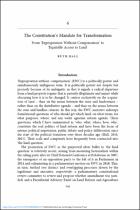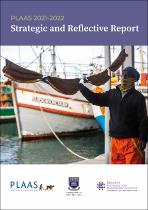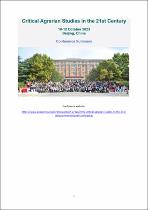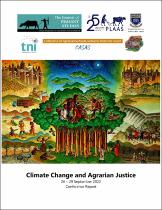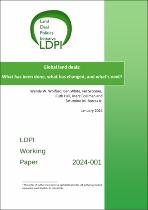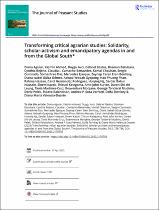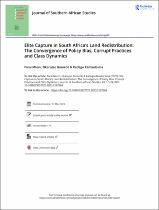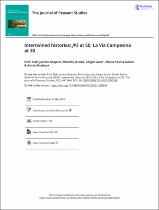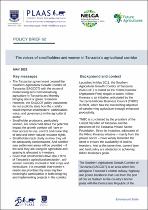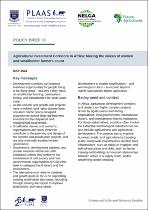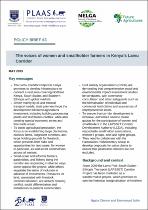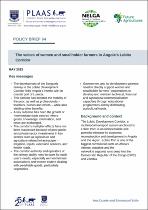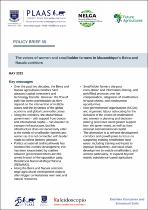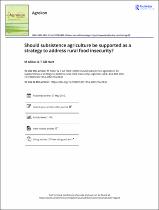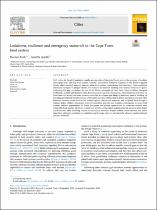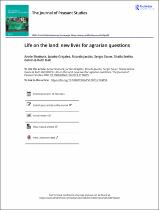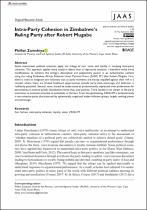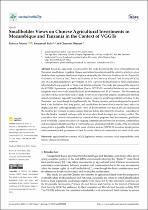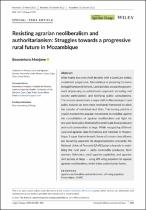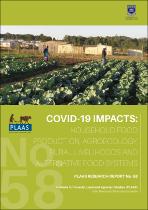Institute for Poverty, Land and Agrarian Studies (PLAAS)
Browse by
The Institute for Poverty, Land and Agrarian Studies (PLAAS) engages in research, training, policy development and advocacy in relation to land and agrarian reform, rural governance and natural resource management. It is committed to social change that empowers the poor, builds democracy and enhances sustainable livelihoods.
Collections in this community
Recent Submissions
-
The constitution’s mandate for transformation From ‘expropriation without compensation’ to ‘equitable access to land’
(Cambridge University Press, 2024)Expropriation without compensation’ (EWC) is a politically potent and simultaneously ambiguous term. It is politically potent not despite but precisely because of its ambiguity, in that it signals a radical departure from ... -
Strategic and Reflective Report: PLAAS 2021-2022
(Institute for Poverty, Land and Agrarian Studies: PLAAS, 2022)This biennial report offers an account of PLAAS during a time of challenge and transition. If 2020 was the Year of the Pandemic, then 2021-2022 ushered in the Years of the New (ab)Normal. In 2020, attention was almost ... -
Critical agrarian studies in the 21st century
(University of the Western Cape, 2023)Prof Ye Jingzhong welcomed participants. Prof Lin Wanglong, vice president of China Agricultural University, gave a welcoming speech on behalf of CAU. Prof Ruth Hall welcomed everyone and thanked COHD and CAU, on behalf ... -
Climate change and agrarian justice
(University of the Western Cape, 2022)Three papers formed the focus of this session. Zehra Yaţın et al presented on the environmentalisation of the agrarian question and the agrarianisation of the climate justice movement. Noemi Gonda et al presented on ... -
Global land deals: What has been done, what has changed, and what’s next?
(The Land Deal Politics Initiative, 2024)In 2010, the Land Deals Politics Initiative formed to study the rising number of large-scale land deals taking place around the world. As the so-called ‘global land grab’ took shape, we organised small grant competitions ... -
Transforming critical agrarian studies: Solidarity, scholar-activism and emancipatory agendas in and from the Global South
(Taylor and Francis Group, 2023)This paper examines the challenges and opportunities faced bycritical agrarian scholars in and from the Global South. We arguethat despite the historical and structural limitations, the criticaljuncture of convergence of ... -
Elite capture in South Africa’s land redistribution: The convergence of policy bias, corrupt practices and class dynamics
(Taylor and Francis Group, 2023)Land reforms are an important mechanism for addressing inequalities in society. Whileaddressing South Africa’s racialised land inequalities remains crucial, new forms of classinequality are produced through land reform, ... -
Intertwined histories: JPS at 50, La Via Campesina at 30
(Taylor and Francis Group, 2023)The Journal of Peasant Studies was founded 50 years ago, in 1973, amidst an oil price crisis, the end of the gold standard and the beginning of the debt crisis, an agrarian famine in Bangladesh, and what some consider the ... -
The voices of smallholders and women in Tanzania’s agricultural corridor
(UWC PLAAS, 2023)The Tanzanian government created the Southern Agricultural Growth Corridor of Tanzania (SAGCOT) with the vision of modernising and commercialising agriculture in Tanzania and thereby bringing about a ‘green revolution’. However, ... -
Agricultural investment corridors in Africa: Making the voices of women and smallholder farmers count
(UWC PLAAS, 2023)Development corridors can improve livelihood opportunities for people living in far-flung areas – but only if they focus on smallholder farming, pastoralism, fishing, and infrastructure for small-scale trade. Land rights ... -
The voices of women and smallholder farmers in Kenya’s Lamu Corridor
(UWC PLAAS, 2023)The Lamu Corridor Project in Kenya promises to develop infrastructure to connect a vast area covering Northern Kenya, South Sudan, and Southern Ethiopia with global markets. Driven mainly by oil and mineral transport ... -
The voices of women and smallholder farmers in Angola’s Lobito Corridor
(UWC PLAAS, 2023)The development of the Benguela railway in the Lobito Development Corridor links Angola’s interior with its coastal port of Luanda. This corridor has boosted the mobility of the poor, as well as professionals –teachers, ... -
The voices of women and smallholder farmers in Mozambique’s Beira and Nacala corridors
(UWC PLAAS, 2023)Over the past two decades, the Beira and Nacala agricultural corridors have attracted capital investment and technology transfer. However, the flow of both has been unpredictable as they depend on the intervention of ... -
Should subsistence agriculture be supported as a strategy to address rural food insecurity?
(Taylor and Francis Group, 2009)At first glance South Africa’s black farming sector appears to contribute rather minimally to overall agricultural output in South Africa. However, despite the complexity involved in this sector and the often marginal ... -
Lockdown, resilience and emergency statecraft in the Cape Town food system
(Cities, 2022)Well before the Covid-19 pandemic, rapidly growing cities of the global South were at the epicenter of multiple converging crises affecting food systems. Globally, government lockdown responses to the disease triggered ... -
Life on the land: New lives for agrarian questions
(Taylor and Francis Group, 2023)The politics of food, climate, energy, and the yet unfinished work ofending colonialism run square through questions of land. Theclassical agrarian question has taken on new forms, and a newintensity. We look at four ... -
Intra-party cohesion in Zimbabwe’s ruling party after Robert Mugabe
(Journal of Asian and African Studies, 2023)Some mainstream political scientists apply the trilogy of exit, voice and loyalty in studying intra-party cohesion. This approach applies more neatly in liberal than in repressive contexts. I therefore make three modifications ... -
Smallholder views on Chinese agricultural investments in Mozambique and Tanzania in the context of VGGTS
(MDPI, 2023)Based on a case study in each country, this study documents the views of Mozambican and Tanzanian smallholders regarding Chinese agricultural investments and the extent to which investors abide by their legitimate land ... -
Resisting agrarian neoliberalism and authoritarianism: Struggles towards a progressive rural future in Mozambique
(Wiley, 2022)After nearly two and a half decades with a Land Law widely considered progressive, Mozambique is preparing to revise its legal framework for land. Land activists accuse the government of pursuing an authoritarian approach, ... -
Covid-19 Impacts: Household Food Production, Agroecology, Rural Livelihoods and Alternative Food Systems
(Institute for Poverty Land and Agrarian Studies (PLAAS), 2023-02)

